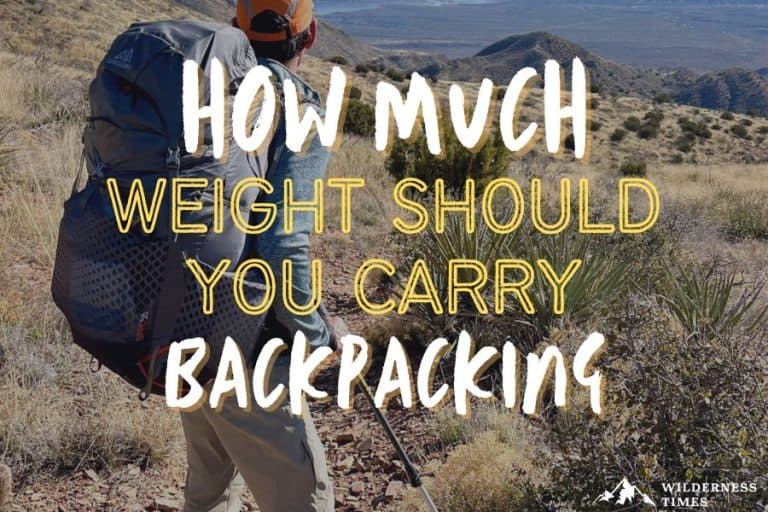The simple answer to the simple question is “as little as possible,” but the difficulty is also hidden in that catch-all phrase. What does “possible” mean?
The weight you carry backpacking will depend on a variety of factors, such as the length of your trip, the terrain you’ll be hiking, and your level of fitness.
But it is generally recommended to aim for a total pack weight (including all gear, food, and water) of no more than 20-25% of your body weight.
How much weight should you carry backpacking?
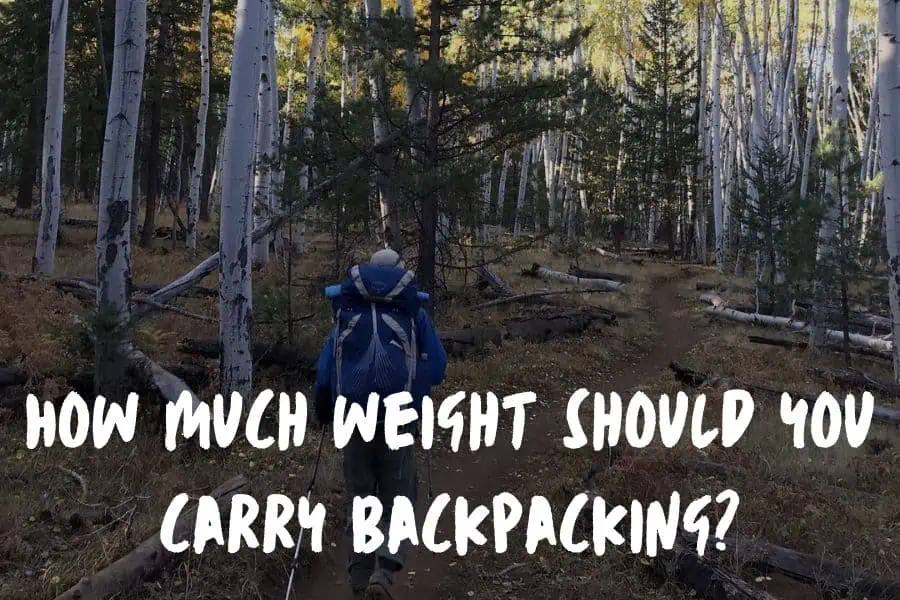
The general guideline is to aim for a total backpack weight (including all gear, food, and water) of no more than 20-25% of your body weight.
For example, if you weigh 150 pounds, you should aim to carry no more than 30-37.5 pounds:
BODY WEIGHT (LBS) | TOTAL PACK MAX WEIGHT (LBS) |
100 | 20-25 |
125 | 25-31.25 |
150 | 30-37.5 |
175 | 35-43.75 |
200 | 40-50 |
225 | 45-56.25 |
But again, you really want to pack as little as possible, and only what is necessary for your trip.
If you are going on a day or multi-day hike, one of the biggest considerations you will have is what you pack and how much that weighs.
There is always a balance to be had, but getting that balance right takes considerable thought and experience.
The lighter your pack, the easier it is for your body to carry it and you should aim to keep the weight down.
However, you must pack enough equipment and food to keep yourself, at the very least, safe on the trails.
You will be able to hike better and longer if you are comfortable and properly hydrated and fed. This is where the art of great packing comes in.
Read More: How to Pack a Backpack 101
Questions to Ask Before Packing for Your Backpacking Trip
To help you achieve the perfect backpack weight for your trip, break down your needs and assets beforehand.
Each hiker is different, each hike is different and each day’s weather might well be different so you need to plan accordingly.
By doing your research and answering the questions below, you will be able to best plan for your trip.
Some questions to ask before packing for your backpacking trip are:
- How Long Will You Be Backpacking?
- What Will the Weather Be Like?
- What is your fitness level?
- How experienced are you with backpacking?
How Long Will You Be Backpacking?
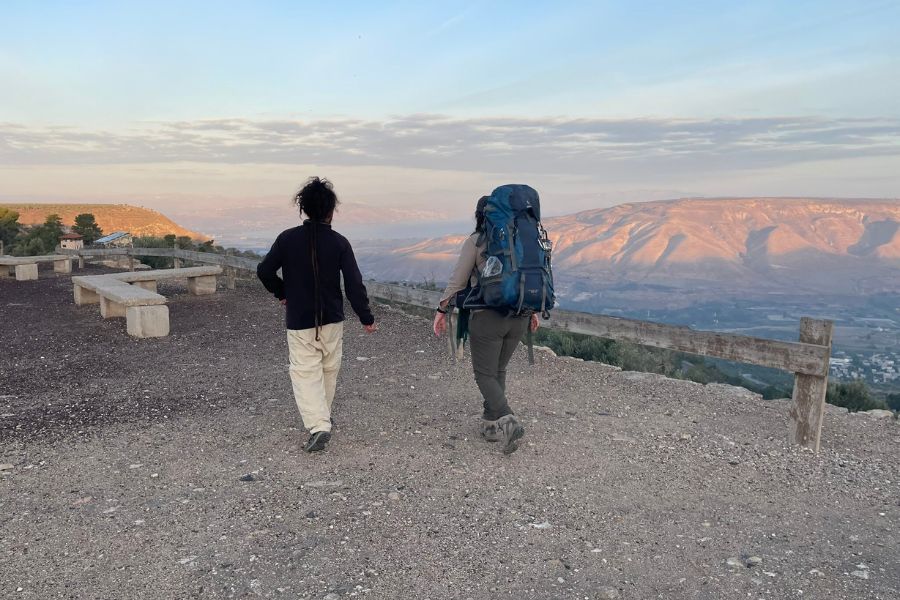
This is an absolutely vital question.
If you are going for a day hike, you can dispense with sleeping bag, tent, cooking gear etc.
All you will need to pack is the clothes needed, a good medical and emergency kit, enough water and food/snacks for a day.
Your pack should be nice and light, even if you need extra clothing.
Water is always the heaviest item. On a hot day in the mountains I always carry 3 litres which weighs 3 kilogrammes.
With extra clothing items for warmth and wet and a good supply of food, I would estimate my backpack to be around 6kg when I set off.
For a multi-day hike, I have found that packing for 3 days is much the same as packing for a month.
Water has to be replenished daily or every 2 days at a stretch, so the 3 litre rule holds.
Food will be your biggest variable weight.
If you are on a route where you can replenish daily/2 days with fresh items, budget an absolute maximum of 1kg for food – 350g is ideal – and 1kg for equipment (again this is the absolute limit) – gas is the heaviest thing you will carry.
If you are on a route where you cannot reprovision, then dehydrated adventure foods which carry a massive calorific punch for very little weight are essential.
Tent and sleeping gear will be the same weight whether you are on a longer or shorter hike.
Keep things minimal but don’t sacrifice weather worthiness and all comfort.
Rest is one of the number one ways to keep strong and healthy during your hike.
Don’t be tempted to pack extra clothes or toiletries. You are going to stink but dirty clothes are rarely health hazards (unless you have a companion with a sensitive nose).
I have one set of day clothes and one set of night clothes and one extra pair of socks.
I also take a pair of sandals for camp.
Don’t pack useless things like deodorant or shampoo. Use tiny bars of soap and a mini microfibre washcloth and towel.
What Will the Weather Be Like?
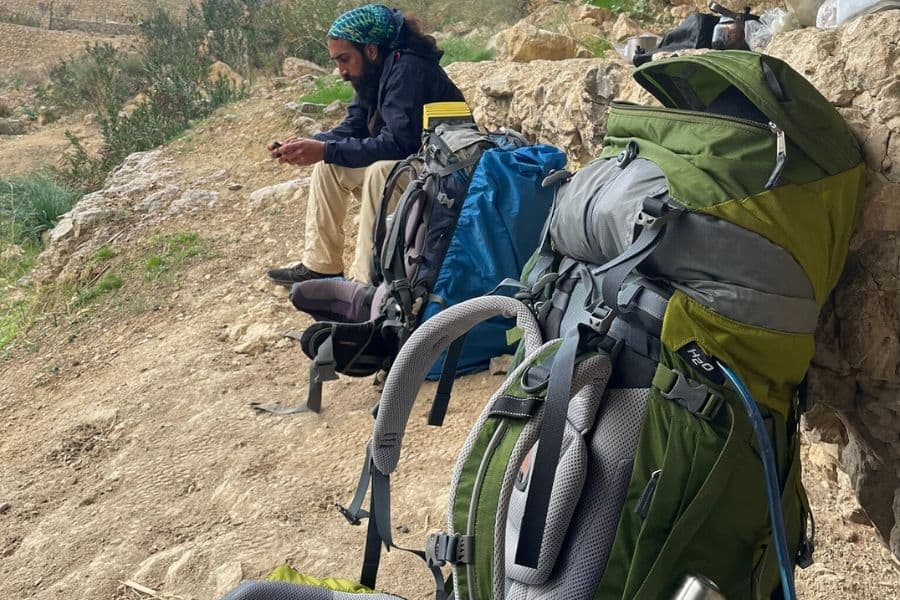
The weather is your greatest enemy or friend.
It is absolutely crucial that you check long -range forecasts before you go and then don’t trust them and make sure you have packed enough for warmth and to keep dry.
This is true whether you are doing a one-day hike or a multi-day hike.
Even if the sun is broiling when you are at the base of the mountain, there may be snow on top.
Wind chill is a serious hazard. Do not sacrifice your safety for the desire to keep the pack light.
For anything more than a 3 hour hike, I always pack a down jacket, a rain jacket and water proof trousers. This is even when I am starting off in 35C.
Base layers are your friend. For multi-day hikes, for daytime wear I will have: hiking trousers, a long-sleeved top, a fleece, down jacket and rain wear, a cap, sunglasses, a buff or a scarf.
For nightwear: a soft bra, leggings, a long-sleeved top and a beanie, then the fleece or down can be doubled up and the spare socks worn in the sleeping bag.
If my day wear is damp from sweat or wet from rain, I pop it in with me in the sleeping bag overnight to dry off.
It is an absolute safety essential that you have a warm layer with you as well as your emergency foil blanket.
If you or a companion fall and break something, shock will bring their temperature down quickly.
Do not underestimate this. It’s why I always carry a down/equivalent.
What is your fitness level?
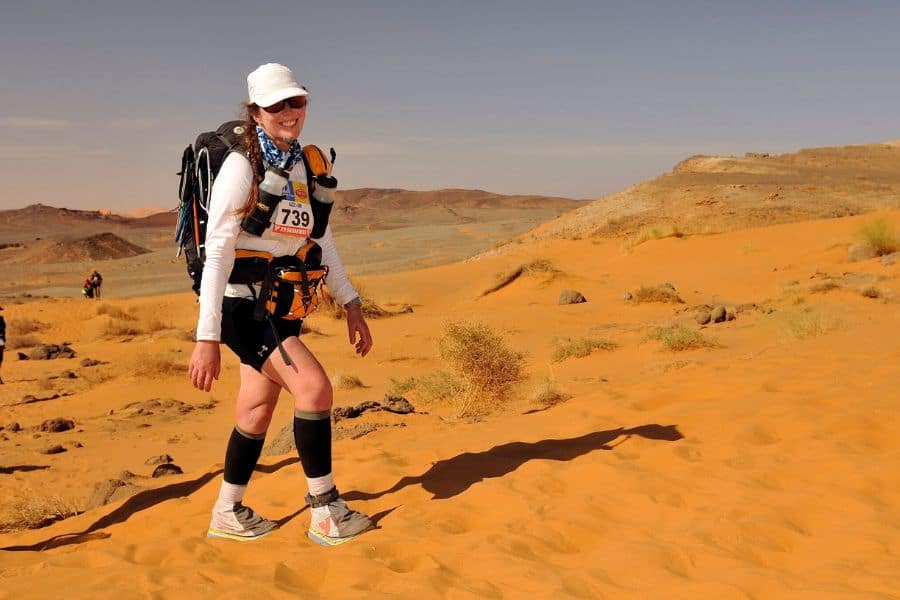
This really does make a difference to your ability to sustain backpack weight.
I am terrible at training between long hikes so I almost always start out without a great level of fitness and I suffer.
It is a cycle I am really trying to break.
Don’t let sub-optimal fitness stop you from hiking, but if you can bite the bullet and prepare well it will make the hike much more pleasurable.
A strong core will really help you.
If you can keep your torso balanced and sitting nicely straight above your hips, you will be able to support the weight of the pack much more easily.
A strong upper back and shoulders are also a big benefit.
Your legs should be bomb proof. Apart from just getting out and stomping, some of the best exercises you can do are weighted step ups.
Start at 100 with a step that makes your thigh extend at a right angle, and load with 10kg. Step up, alternating legs.
As you get stronger, increase the reps and increase the weight.
How experienced are you with backpacking?
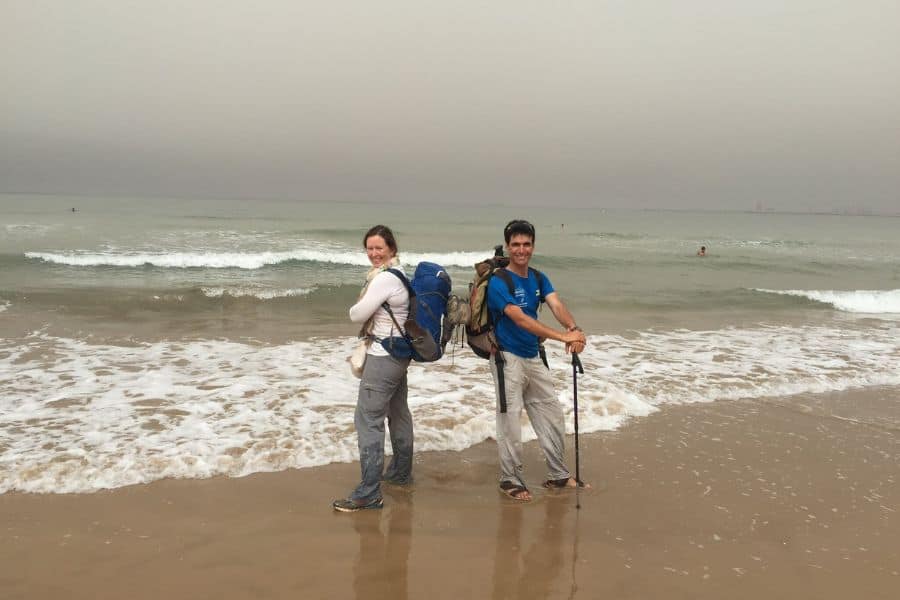
If you are an experienced backpacker, you will have already sussed out what you need and what you can leave behind.
If you are relatively new to it, then the golden rule is to test out your kit and to practice with your pack.
I have set out for a month-long expedition with a relatively untested rucksack.
I had to ditch it after two days and buy a new one. It was just too big and, because I hadn’t had any proper long,
consecutive days, I hadn’t realised. It was an expensive mistake.
Old kit is the best kit. Use what you have used before and what you know works for you.
If you are buying new kit, then test it out on shorter hikes before you head into the wilderness for days.
This is especially true of the big items like your tent. Even if you practice in your back yard, make sure you are really familiar.
Don’t put it up for the first time in torrential rain, pitch dark and when you are totally exhausted and starving hungry. (Yep, I learnt the hard way!)
How to reduce pack weight OR Tips to pack a backpack
Determine Your Base Weight
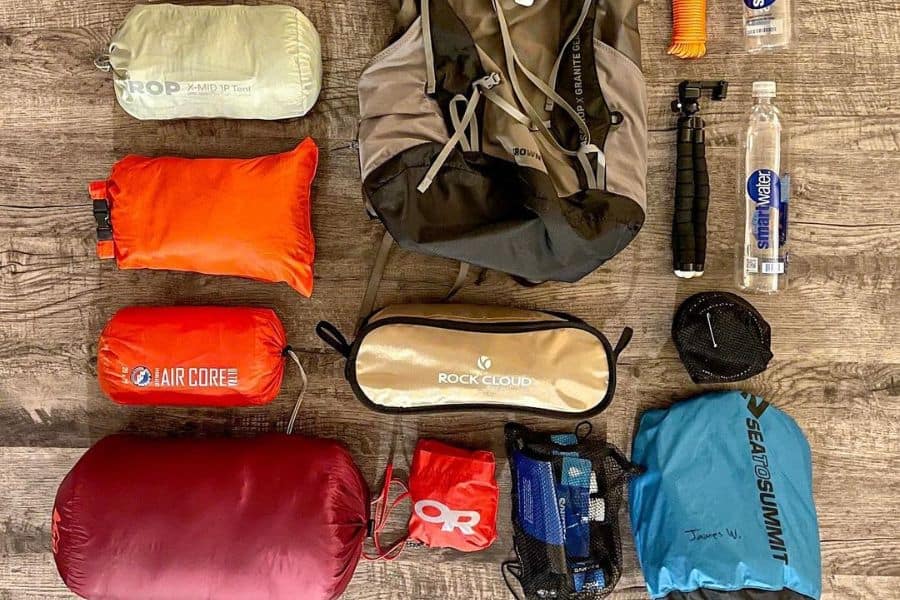
What items can you absolutely not do without? This is your base weight.
Do not forget to factor in your water and make it realistic. You can do without an extra pair of underpants.
You cannot do without a warm layer.
Some items are optional but for a reasonably lightweight add hugely to your comfort.
A sleeping mat, I would argue, is worth it for the weight but I would always go for a foam one.
I have had too many air ones deflate after being pricked by a thorn or sharp stone.
I also set a maximum weight, which I cannot exceed. As light as possible is the rule.
The absolute maximum weight is 25% of your own body weight – so if you weigh 120 lbs then you can carry up to 30lbs in your backpack.
I personally will not exceed 33lbs – 15kg – in a backpack for a multi-day hike.
This is more than heavy enough – too heavy really but food and water weigh!
Weigh Your Gear
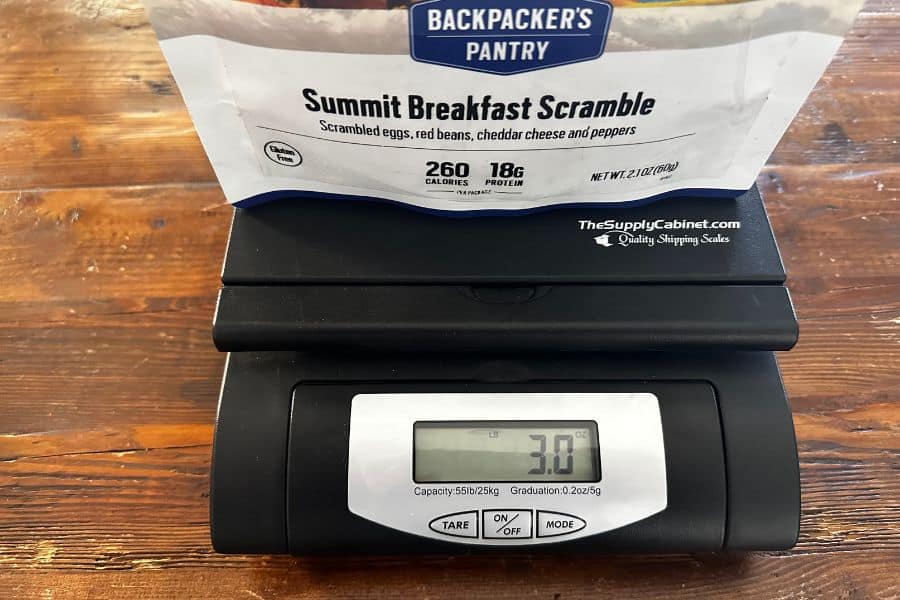
You will be amazed at how much weight you can start saving when you weigh each individual item.
Did you know that your toothbrush handle weighs 5g and you don’t really need it? Chop it off.
The foil bags that adventure food comes in weigh 25g each. Swap them out for clear plastic ziplock – make sure to label clearly.
Weighing your gear also has a vital psychological function. It gives you nowhere to hide.
You can’t pretend to yourself that the pack weighs less than it does or that it won’t be too bad when you are out on the trail.
Also, it is really fun trying to beat that weight down to a manageable level.
It’s spirit cleansing to just bring the bare minimum.
Invest in Multi-Use Items
Anything that you can use for multi purposes is a win.
One of my favourite pieces of kit is a 500ml titanium mug.
I use it with a micro stove as my kettle for hot drinks and my pan for food.
It is also my drinking mug for stream water and it can be a makeshift shower to pour water over my hair and back when river bathing.
Choose Lightweight Gear
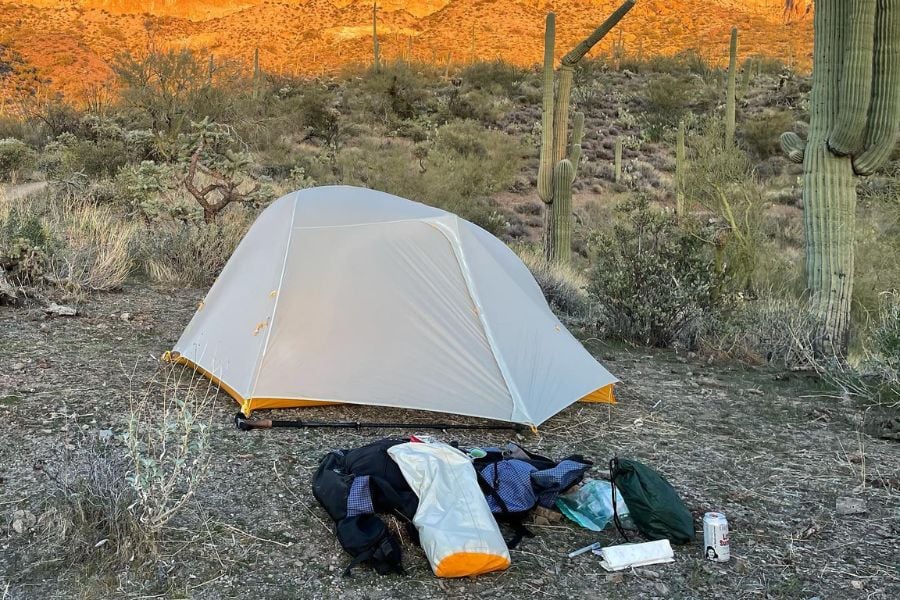
Lightweight often means more expensive. If you can possibly afford it, go for the lightest, best tent available. It will help you so much.
You are going to need to make some hard choices.
Always compare like products on weight and make it one of your important factors when buying.
Your tent will probably cause you the most angst.
Keep it as light as possible but factor in the effectiveness of your pegs, or if you can find good rocks etc on the way, and also think seriously about a groundsheet if the weather is going to be wet.
I would strongly advise talking to someone in-store before you buy one.
Rain gear and your warm layer are other areas where lightweight will make a big difference.
Console yourself with the knowledge that expensive but excellent gear lasts a very long time.
If you do over a 1000 km in it, then paying $250 for that jacket doesn’t feel quite so painful.
Plan your meals
Don’t pack too much. High-calorie, low-weight is the best way to go.
800 calories for 150g is a very good ratio. You only need around 2000 – 2500 calories a day, so don’t take more than that.
On ultra races, I always pack exactly to the recommended calories so that I don’t waste anything.
It is very rare that you are hungry after you have ploughed your way through a 1000 calorie freeze-dried meal.
Plan your snacks too and remember that you are going to get sick of even your most favourite food, so variety is good.
Also, many people find that sweet things become unbearable after a time. Consider majoring on the savoury.
Do take salt tablets and electrolytes and dates are a super food. You can survive on just 7 a day.
Share the load
If you are a pair or a group, divvy out the shared cooking and bivouac equipment.
Try and be as fair a possible as over a long distance someone doing more than their share may start to feel resentful.
Follow a gear list
I always write down an extensive list, lay everything out, weigh it, look at the conditions, strip out as much as I can and then pack.
On your list you must have a medical kit, emergency blanket, mirror and whistle.
If I am going somewhere with mobile coverage, I always take a light solar panel so I can recharge.
Download: Overnight Backpacking Checklist
What Type of Backpacker Are You?
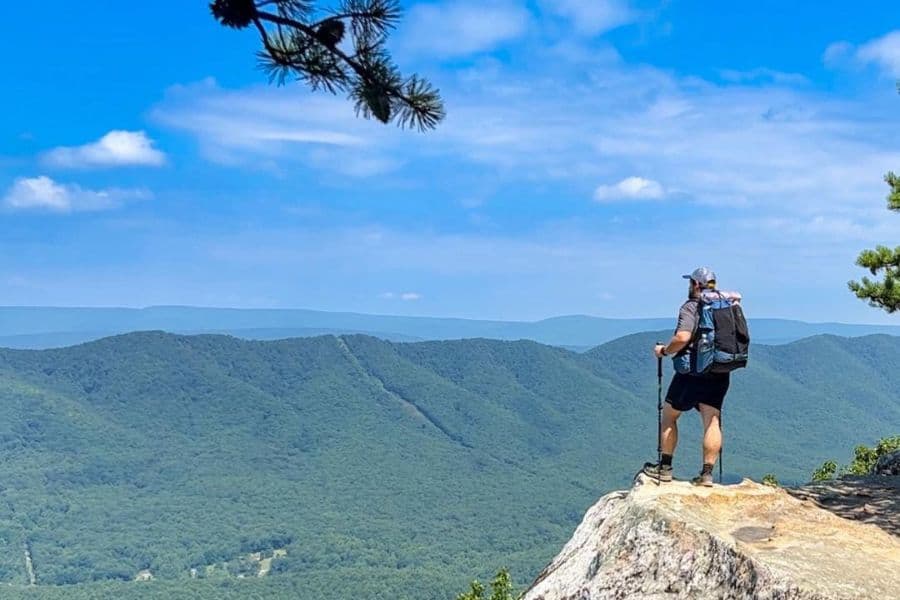
There are lots of reasons to backpack and it can be hard to split it into categories but as a general rule it might be useful to think about why you are undertaking this trek.
Are you trying to achieve a Fastest Known Time or are you all about being out in nature?
Backpacking to Enjoy the Location
If you are out there to enjoy the location and you don’t aim to cover too many miles per day, then you can afford a slightly heavier backpack.
Don’t overdo it though. If your back is aching and your shoulders are rubbed raw, you won’t find those views quite so enjoyable.
Pounding the Miles Backpacker
If you are on a mission to go fast and cover a lot of distance, you will want to be as light as possible and will want to consider every ounce.
Think about sacrificing your sleeping mat and swapping out a backpacking tent for a bivy bag.
Just have the clothes you are wearing, and maybe lose one layer.
Banish all extras and make sure you save on any packaging or extras.
What is the best way to pack a backpacking backpack?
Order, order, order. Use featherlight packing bags to keep gear separate and use all your compartments.
Do not have loads of random stuff floating free.
There is nothing more frustrating than having to empty your whole bag just to get out your headtorch – especially as this almost always happens in the dark.
Keep your camp equipment separate from your clothes and your food in the order you are eating it in.
Make sure you have waterproof bags for everything.
A bin liner on the inside weighs 20g and can be the difference between a damp and a dry night.
FAQs
What’s the recommended weight limit for backpacking?
This is absolutely dependent on your strength and fitness.
A Navy Seal can carry up to 45kg in his pack and be battle ready. Most of us can’t.
For running the Marathon des Sables, 6 marathons across the desert in six days, my backpack for the full week including all food and equipment was 6.3kg +2 litres of water refilled at every check point.
For walking across Jordan for a month in winter weather, it was 15kg and that was on the heavy side.
Can carrying too much weight cause injury while backpacking?
Carrying too much weight will seriously jeopardise the success of your expedition.
You can get bad sores on your back and hips.
In addition, backache will debilitate you. Your legs will tire and you will be much more prone to accident and injury.
How do I calculate the weight of my backpack for backpacking?
Weigh everything, not forgetting the pack and then add in your water weight.
The weight of many items will actually already be available online on the kit specification.
Or use luggage scales (the one that is suspended with a hook is best). Some people weigh themselves and then get on the scales with the pack on.
What are some essential items I should always carry in my backpack while backpacking?
You must always have adequate water, a medical kit, an emergency blanket/mirror/whistle and a warm layer.
I also think you should always use or carry walking poles.
I actually broke a leg in Patagonia but managed to continue for 5 days because I had poles.
Is it better to distribute the weight evenly throughout my backpack or pack heavier items at the bottom?
Always pack your heavier items at the bottom. You don’t want to overbalance like a turtle.
How does the weight of my backpack affect my overall hiking speed and endurance?
The weight and also comfort of your backpack does affect your speed. You can mitigate this to some extent by using poles. The heavier your pack is, the slower you will go.
Can using a lightweight backpack make a significant difference in the weight I carry while backpacking?
Recent developments in fabric have meant that packs are getting lighter and more durable. Go for the lightest you can afford.
How much water should I carry in my backpack while backpacking?
How much water you need depends on how much water will be available on the route.
If you have a full day ahead without any water I would take 3 litres in warm conditions and 2 in cold.
Conclusion
Planning and packing are a vital part of any hike or expedition.
They can make the difference between success and failure.
The lighter you pack and the better you train, the more you will enjoy your adventure.
Never sacrifice safety but do cut the handle off your toothbrush, that 5g saved will come in handy! Happy Hiking.

